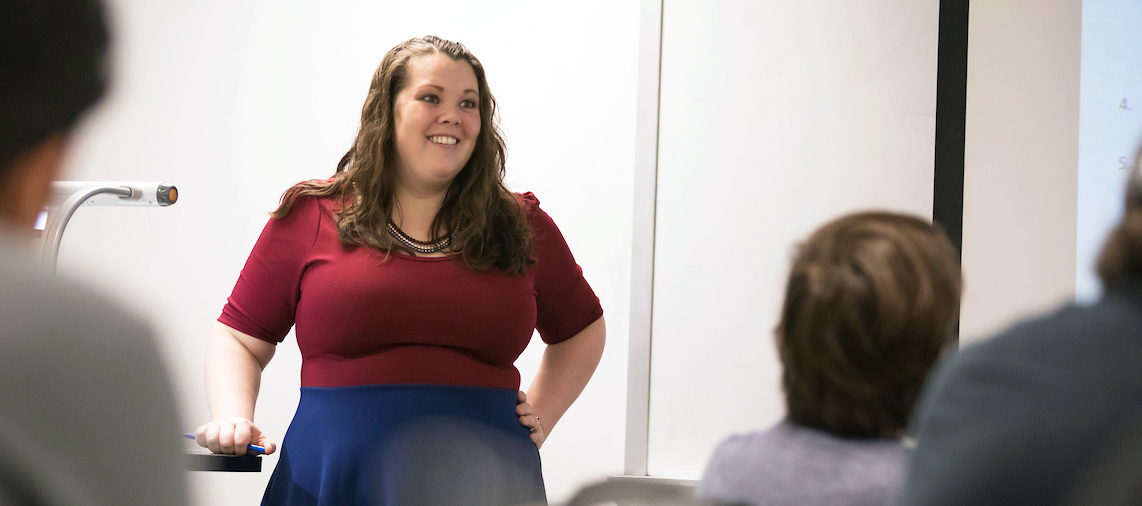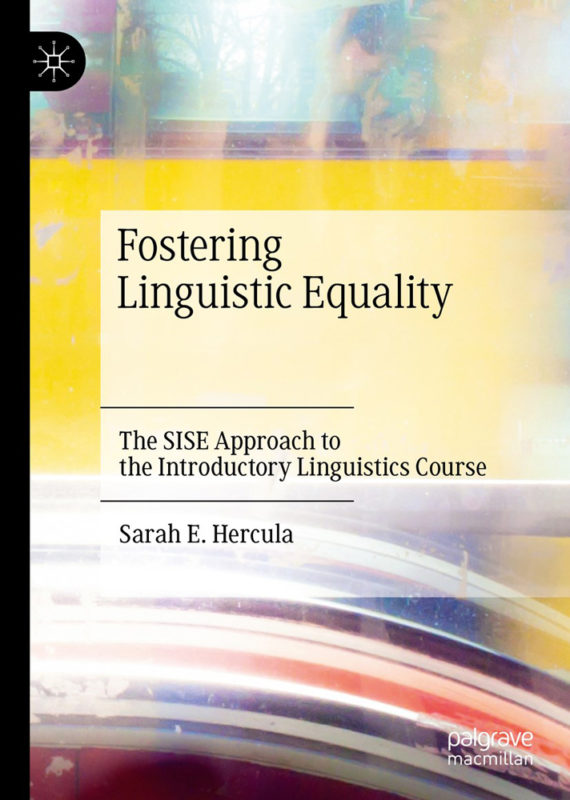Not all language is perceived as equal
Posted by Delia Croessmann

Sarah Hercula teaching in the linguistics classroom. Photo by Sam O’Keefe was taken before current COVID-19 guidance.
When Dr. Sarah Hercula set out three years ago to write her new book, Fostering Linguistic Equality: The SISE Approach to the Introductory Linguistics Course, little did she know it would come off the press at one of the most compelling times in the racial history of the United States — fewer than two weeks before the May 25 death of George Floyd at the hands of police. That defining event, combined with other similar acts, is continuing to incite nationwide protests over racial injustice.
“Fostering Linguistic Equality is a call-to-action for linguists to work to change culturally ingrained attitudes about stigmatized language,” says Hercula, an assistant professor of English and technical communication at Missouri S&T who has created a new approach to teaching linguistics. “These attitudes contribute to racial profiling and inequalities throughout our society.”
Hercula was initially motivated to create an antidote to linguistic discrimination after she faced a perceived personal failure as a high school English teacher in a small, low-income African American community. She found her students resisted her efforts to correct their socially stigmatized language. With her new methodology, she seeks to correct the harmful teaching methods that place some students in privileged positions and others at an educational disadvantage.
Hercula’s target audience for the approach is linguistically privileged undergraduate students — those who are born into acquiring a powerful language, such as English, and specifically an English dialect perceived as high in status and intersecting with privileges associated with race, region, nation and social class.

“By being vulnerable with my students and willing to share my failures and successes, I seek to help them process the feelings of shame and guilt that they may experience when they discover and dismantle their own linguistic privilege and prejudice,” says Hercula.
Hercula’s work draws on extensive research on linguistic inequality that establishes the way language variation occurs. She found that ignorance of these facts leads to linguistic discrimination, an erroneous belief that people who speak in certain dialects are less intelligent or inferior to speakers of the preferred or standardized language. These language prejudices and profiling can manifest themselves in a lack of opportunity in social domains such as employment, housing and education, as well as in the legal system, says Hercula.
One of the most blatant examples of linguistic discrimination described in the book is how the testimony of a key prosecution witness in the trial of George Zimmerman, a white neighborhood watchman, charged with murder for the 2012 shooting of Trayvon Martin, a young African American man, likely affected the jurors’ final decisions. The witness, Rachel Jeantel, a young African American woman, was ridiculed on talk shows and on social media as inarticulate, incomprehensible and lacking credibility. Research by Stanford University linguistics scholars John R. Rickford and Sharese King illustrate how the lack of understanding of her speech combined with linguistic bias influenced the jurors’ reception of her testimony, and consequently, the outcome of the case, which was Zimmerman’s acquittal.
Hercula’s Structural Inquiry of Stigmatized Englishes (SISE) pedagogy provides teachers, students and researchers with tools to counteract prejudicial attitudes and disinformation about language, both in- and outside the classroom. The methodology analyzes socially stigmatized dialects, including African American, Chicano and Appalachian Englishes, but it can be used with any number of dialects, such as Southern or East Coast English. It can also be used to explain and change bias toward the way women communicate, says Hercula.
“For example, the overuse of the word ‘like’ by young white women associates them with a West Coast stereotype of being ditzy and unintelligent, but the word is actually a discourse marker to give the speaker pause for thought or to check in to see if a conversation partner is listening,” Hercula notes. “We’ve now learned that men use the word too, but are not looked down upon. Judgments about language are always connected to other social factors.”
Hercula created the pedagogy for students in the undergraduate linguistics course who often go on to work in unrelated fields. She seeks to help them understand the devastating effects linguistic inequality can have on the lives of those whose language is stigmatized and to help them apply their newly found knowledge.
Hercula’s linguistics teaching method offers one possible, empirically-based solution to socialized inequality by empowering students—or anyone seeking more information about the relationships between diversity, inequality and language—to be ambassadors for change.
Sounds very interesting. I never thought that a southern dialect or a African American dialect made you sound uneducated. I have often be accused of sounding southern, so I have worked very hard to try not to use so certain words. I would love to read this book to see how I can become more understanding of others.